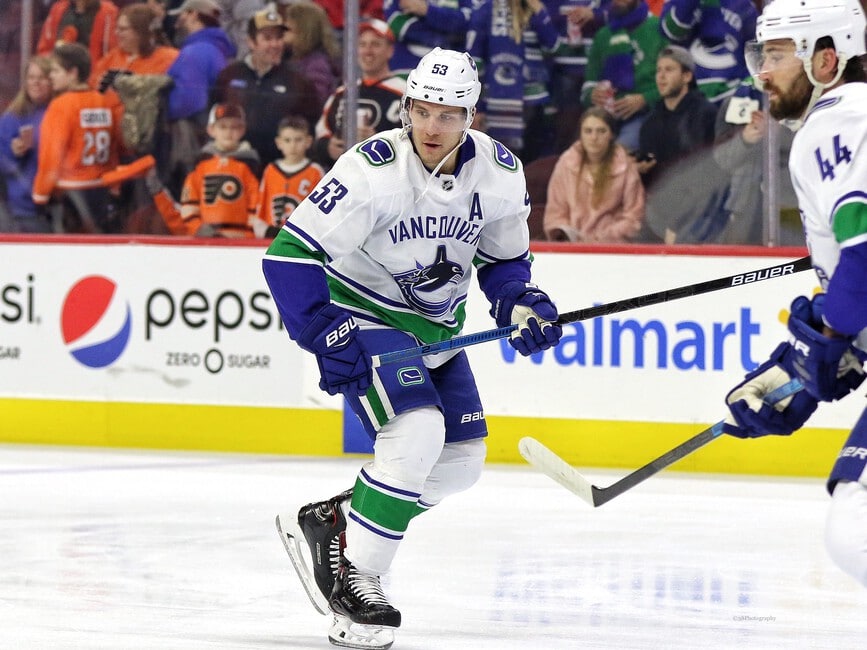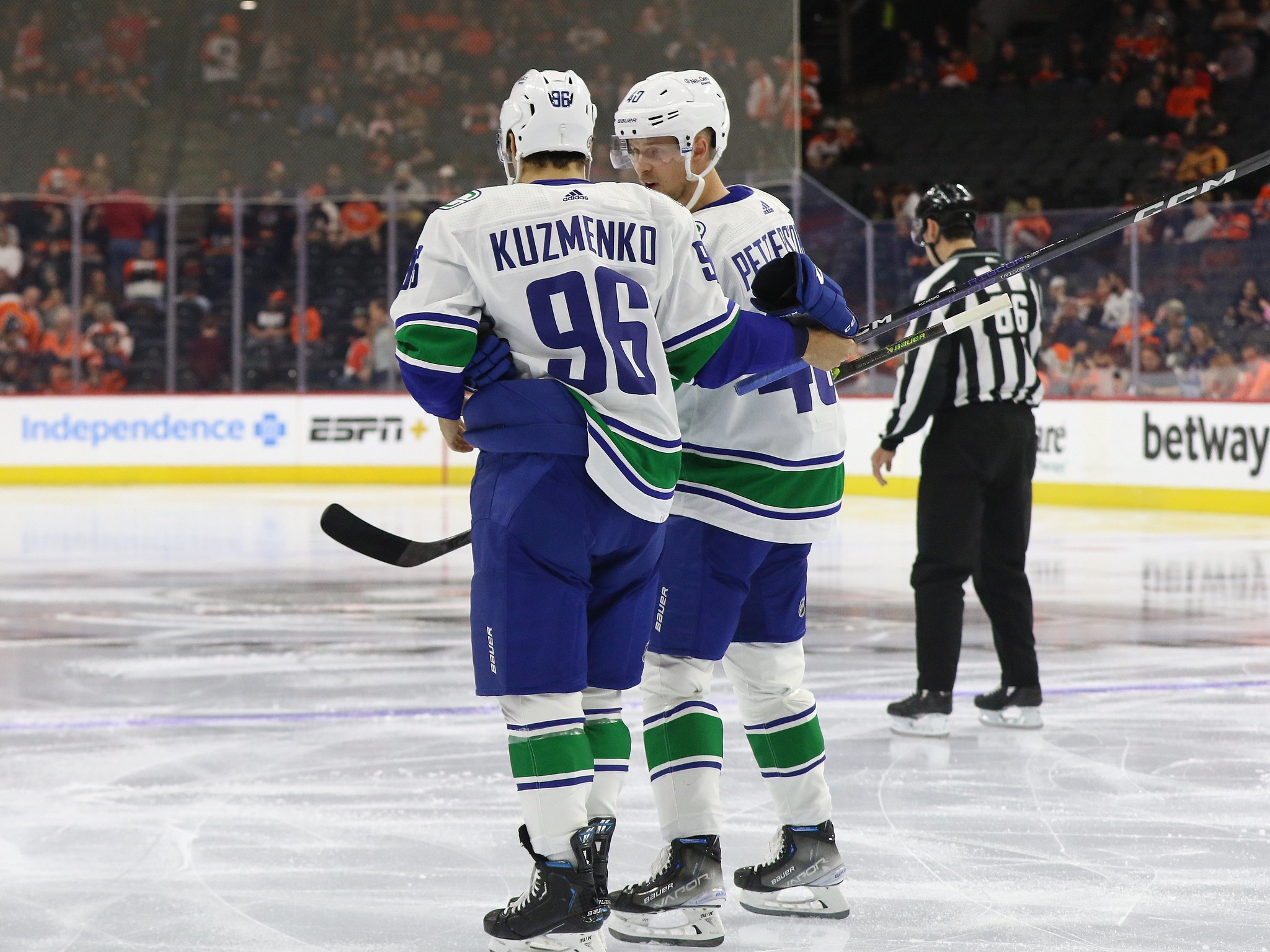The Vancouver Canucks have inked Andrei Kuzmenko to a two-year extension. The deal is worth $5.5 million per season and includes a 13-team no-trade clause. It’s a fair deal for a player who has exceeded expectations in his NHL rookie season, potting 21 goals in 47 games for a total of 43 points. All that said, the Canucks choosing needing to sign Kuzmenko is also the result of a couple of contract negotiation mistakes and the organization passing up on a golden opportunity to sell at a point his value was the highest.
The Canucks Chose the Wrong Player
Most insiders believed it was either Bo Horvat or Andrei Kuzmenko. The belief was that the team couldn’t afford to keep both. If that’s true, one could argue the Canucks likely made an incorrect choice. Horvat is proven, he’s a leader and he’s going to make a team extremely happy over the next many seasons. That team should have been the Canucks, but this deal with Kuzmenko essentially walks Horvat out the door.

Moreover, if the Canucks wanted both players, the mistake was made when the team extended J.T. Miller to a monster contract. He’s done little to warrant the seven-year, $8 million extension (that also includes a no-move clause) and with his antics and tantrums, he’s been a huge distraction for the club this season.
The reality is, Vancouver should have tried to rid itself of that Miller deal, even if it cost them a sweetener to do so. At the very least, they shouldn’t have rushed to sign it a summer before they needed to. Now, if the player can’t be dealt, he’ll likely never be because, after this year his full no-move clause kicks in and it will be too late.
Kuzmenko Was Worth More in Trade Today
For argument’s sake, let’s say the Canucks wanted both Miller and Horvat. They should have identified that there would have been a massive market for Kuzmenko on the trade front. With the deadline rolling around and with teams absolutely stuck based on their respective salary cap issues, a forward with his production making only $950K could have had tremendous value for Vancouver in any deal. And, with the team ready to offload almost anyone not named Quinn Hughes and Elias Pettersson, GM Patrick Allvin and President Jim Rutherford should have explored the trade waters.
As Thomas Drance of The Athletic writes (and I tend to agree), “Kuzmenko is good and fun. Contract is fair and fine.” He adds, “And there’s also virtually no level of value he can provide the club over the next two seasons that will exceed the opportunity cost incurred by a team in the #Canucks’ situation missing a unique opportunity to sell high.” When someone asked why the team couldn’t just trade him later, he responded, “One-dimensional scoring wingers with money and term committed to them don’t really have value. In any event, his trade value just went from “probably a late first” to “maybe a 3rd if you take back money.”
These next two seasons will be spent watching Kuzmenko score as the team tries to figure out its own mess. Meanwhile, Vancouver would have had teams falling over themselves to add a player like him this season. The laws of supply and demand would have essentially guaranteed multiple picks and a decent prospect coming back. And, Kuzmenko could have gone somewhere else, tried to win a Stanley Cup, and returned to Vancouver as a free agent this offseason.
Canucks Potentially Walked Him Into Free Agency As a Proven NHLer
Now, let’s argue that Kuzmenko was the primary target the Canucks wanted to sign. Yes, one could contend that this deal gives the Canucks an opportunity to see what the player is really worth. A two-year bridge extension at $5.5 million if he doesn’t repeat this level of production is better than locking him in at huge money and then learning it was a mistake later on. But, the Canucks aren’t expected to be very good over the next couple of seasons. Two years of losing means two seasons of Kuzmenko wondering if Vancouver is the best fit for him on a long-term UFA extension.

By the time Kuzmenko is due for another deal, everyone in the NHL will know what he is and what he isn’t. If he’s as good as this season suggests, he’ll be coveted, but he’ll also be 30 years old. If he’s still worth something at the point, it won’t be for eight seasons and any team that acquires him will do so on a mid-term deal at an extremely expensive rate. They’ll be able to afford it because the salary cap ceiling will take a massive jump and it’s anyone’s guess as to who offers up the most money to convince him to sign.
So too, Vancouver has only three forwards signed past the 2025-26 season. If the plan is to contend, to fill their roster, they’ll likely need to spend some money in free agency. Is there any confidence the Canucks will spend it wisely? Will they have anything left out-bid others for Kuzmenko at that point? Locking him in now could have avoided all of that.
You may also like:
- Canucks Draft Misses Since 2015
- Canucks’ Top 15 Prospects for 2024-25 Season
- Daniel Sprong: What to Expect From Canucks’ Newest Signing
- Vancouver Canucks Sign Daniel Sprong to 1-Year Deal
- 5 NHL Teams That Improved in Free Agency
Finally, make no mistake, the turbulence being felt inside the organization may affect what players want to jump to the Canucks as a preferred destination. The fact Vancouver is a Canadian market doesn’t help. The reality is, the drama hasn’t yet worn on Kuzmenko yet. Should the Canucks offload Bo Horvat, trade others, and potentially have different, but newer coaching issues with new bench boss Rick Tocchet, how likely is Kuzmenko to stick around? In two seasons, the team will know and in the meantime, the organization passed up a great opportunity to load up on picks and prospects.
